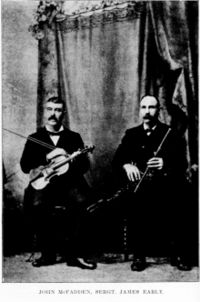Hello! Ask me (almost) anything about traditional music.
Annotation:Lark in the Morning (3)
X:1 T:Lark in the Morning [3] M:6/8 L:1/8 R:Jig S:O'Neill - Dance Music of Ireland: 1001 Gems (1907), No. 240 Z:AK/Fiddler's Companion K:Emin B,|[B,2E2]c BGE|D2d AFD|[B,2E2]c BAF|GFE e2 e/f/| gfe dcB|A/B/AG FED|EFG ABc|BGF E2:| |:B|eBe g<be|dAd f<af|eBe g<be|f<af g<be| f<af gfe|dcd AFD|EFG ABc|BGF E2:|
LARK IN THE MORNING [3] (An Fuiseog Air/San Maidin). AKA and see "Daugherty's Jig," "Road to Sligo (1)," "Trip to Sligo (1)," "When I Parted." Irish, Double Jig or Set Dance. E Minor. Standard tuning (fiddle). AABB. "Bardic poets were much enamoured of intricate wordplay based on tables of correspondences and relationships known as ogham. There were many kinds of ogham: tree ogham, castle ogham, fruit ogham, fish ogham, bird ogham, etc. In bird ogham, the lark is associated with the letter U (Gaelic uiseog = a lark), also with the day of the summer solstice and with the colour of resin. This ogham was probably based on the observation that the lark flies highest towards the sun, singing as he ascends, upon the day when the sun is highest in the heavens" (Williamson, 1976).

O'Neill (Irish Minstrels, 1913) states there was a special dance performed to this "special tune of ancient lineage,... "the rarest and certainly not the least interesting in its class, for it possesses marked individuality all its own." In Irish Folk Music he says he has "a recollection of hearing it alluded to as an old Set-Dance." O'Neill obtained the melody via Chicago fiddler John McFadden who gave it to Sergeant James O'Neill, Francis O'Neill's collaborator, but it was ultimately sourced to Quebec native James Carbray (who was then living in Chicago), who had picked up some tunes from a Kerry fiddler named Courtney (a longtime resident of Canada). O'Neill (Irish Folk Music) also states that McFadden's playing partner, piper Sergeant Early, picked up the tune from an Edison record Carbray made while in Québec. Famed County Sligo fiddler Michael Coleman (1892-1947) recorded the tune in 1923 in a two-tune medley that went by the single title "Daugherty's" ("Tell Her I Am/Daugherty's Jig").
The melody printed in O'Neill as "Lark in the Morning" is usually known in modern times under the title "Trip to Sligo (1) (The)," while the "Lark in the Morning" title is usually reserved for another jig. However popular the jig has been in Irish tradition, it has a Scottish provenance, being the composition of Scottish fiddler-composer John Anderson who originally called it "When I Parted" and printed it around 1790.


